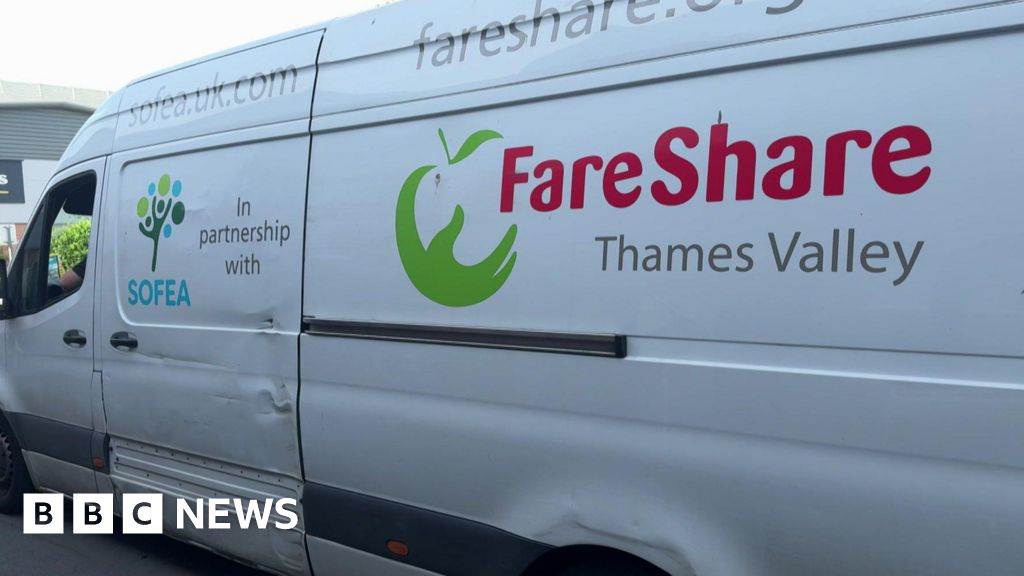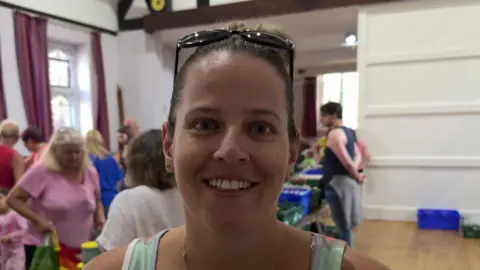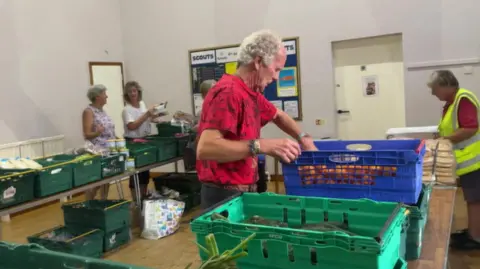Business
Didcot charity increases meal deliveries for school holidays

BBC News, Oxfordshire
 BBC
BBCA charity that redistributes food to community larders delivered about 15,000 more meals to people in July compared to the same period last year.
Sofea, which has a hub in Didcot, Oxfordshire, is part of national food network FareShare, which aims to reduce food waste.
Since the start of the summer holidays, the network said it had delivered 2,500 tonnes of food to charities and families nationally, equivalent to six million meals.
In December Sofea lost thousands of pounds worth of food after flooding damaged its warehouse.

Anthony Leonard, Sofea’s director of operations, said deliveries to local community larders were making a big difference.
“Food from the larders is going directly to people in need,” he said. “When you meet them, the change it gives to their lives is immense.”
Abingdon Community Larder is one of several across the county that Sofea delivers to.
Victoria Henstridge, a single parent who works at a nearby special school, said the larder saved her significant amounts of money and was a huge help to her family.
“I’ve got two boys and they’re adventurous – [it’s difficult] to find time to go shopping and take them to all their activities,” she said.
“On a Friday it helps us with meals for the weekend and sometimes into the next week.”

FareShare said a recent survey found 51% of charities in their network were expecting an increase in demand over the summer holidays.
Volunteer Nigel Northcott said the larder was also a meeting point for local families, with charities such as Age UK on hand to offer advice.
“If [parents] have children home at the holidays, they can bring them here, have a cup of tea and mingle with others,” he said.
“Friendships are built by people who come to our service regularly – we feel that hospitality is an important part of it.”
Business
Private sector data: Over 2 lakh private companies closed in 5 years; govt flags monitoring for suspicious cases – The Times of India

NEW DELHI: The government on Monday said that over the past five years, more than two lakh private companies have been closed in India.According to data provided by Minister of State for Corporate Affairs Harsh Malhotra in a written reply to the Lok Sabha, a total of 2,04,268 private companies were shut down between 2020-21 and 2024-25 due to amalgamation, conversion, dissolution or being struck off from official records under the Companies Act, 2013.Regarding the rehabilitation of employees from these closed companies, the minister said there is currently no proposal before the government, as reported by PTI. In the same period, 1,85,350 companies were officially removed from government records, including 8,648 entities struck off till July 16 this fiscal year. Companies can be removed from records if they are inactive for long periods or voluntarily after fulfilling regulatory requirements.On queries about shell companies and their potential use in money laundering, Malhotra highlighted that the term “shell company” is not defined under the Companies Act, 2013. However, he added that whenever suspicious instances are reported, they are shared with other government agencies such as the Enforcement Directorate and the Income Tax Department for monitoring.A major push to remove inactive companies took place in 2022-23, when 82,125 companies were struck off during a strike-off drive by the corporate affairs ministry.The minister also highlighted the government’s broader policy to simplify and rationalize the tax system. “It is the stated policy of the government to gradually phase out exemptions and deductions while rationalising tax rates to create a simple, transparent, and equitable tax regime,” he said. He added that several reforms have been undertaken to promote investment and ease of doing business, including substantial reductions in corporate tax rates for existing and new domestic companies.
Business
Pakistan’s Textile Exports Reach Historic High in FY2025-26 – SUCH TV

Pakistan’s textile exports surged to $6.4 billion during the first four months of the 2025-26 fiscal year, marking the highest trade volume for the sector in this period.
According to the Pakistan Bureau of Statistics (PBS), value-added textile sectors were key contributors to the growth.
Knitwear exports reached $1.9 billion, while ready-made garments contributed $1.4 billion.
Significant increases were observed across several commodities: cotton yarn exports rose 7.74% to $238.9 million, and raw cotton exports jumped 100%, reaching $2.6 million from zero exports the previous year.
Other notable gains included tents, canvas, and tarpaulins, up 32.34% to $53.48 million, while ready-made garments increased 5.11% to $1.43 billion.
Exports of made-up textile articles, excluding towels and bedwear, rose 4.17%, totaling $274.75 million.
The report also mentioned that the growth in textile exports is a result of improved global demand and stability in the value of the Pakistani rupee.
Business
Peel Hunt cheers ‘positive steps’ in Budget to boost London market and investing

UK investment bank Peel Hunt has given some support to under-pressure Chancellor Rachel Reeves over last week’s Budget as it said efforts to boost the London market and invest in UK companies were “positive steps”.
Peel Hunt welcomed moves announced in the Budget, such as the stamp duty exemption for shares bought in newly listed firms on the London market and changes to Isa investing.
It comes as Ms Reeves has been forced to defend herself against claims she misled voters by talking up the scale of the fiscal challenge in the run-up to last week’s Budget, in which she announced £26 billion worth of tax rises.
Peel Hunt said: “Following a prolonged period of pre-Budget speculation, businesses and investors now have greater clarity from which they can start to plan.
“The key measures were generally well received by markets, particularly the creation of additional headroom against the Chancellor’s fiscal rules.
“Initiatives such as a stamp duty holiday on initial public offerings (IPOs) and adjustments to the Isa framework are intended to support UK capital markets and encourage investment in British companies.
“These developments, alongside the Entrepreneurship in the UK paper published simultaneously, represent positive steps toward enhancing the UK’s attractiveness for growth businesses and long-term investors.”
Ms Reeves last week announced a three-year stamp duty holiday on shares bought in new UK flotations as part of a raft of measures to boost investment in UK shares.
She also unveiled a change to the individual savings account (Isa) limit that lowers the cash element to £12,000 with the remaining £8,000 now redirected into stocks and shares.
But the Chancellor also revealed an unexpected increase in dividend tax, rising by 2% for basic and higher rate taxpayers next year, which experts have warned “undermines the drive to increase investing in Britain”.
Peel Hunt said the London IPO market had begun to revive in the autumn, although listings activity remained low during its first half to the end of September.
Firms that have listed in London over recent months include The Beauty Tech Group, small business lender Shawbrook and tinned tuna firm Princes.
Peel Hunt added that deal activity had “continued at pace” throughout its first half, with 60 transactions announced across the market during that time and 10 active bids for FTSE 350 companies, as at the end of September.
Half-year results for Peel Hunt showed pre-tax profits jumped to £11.5 million in the six months to September 30, up from £1.2 million a year earlier, as revenues lifted 38.3%.
Peel Hunt said its workforce has been cut by nearly 10% since the end of March under an ongoing savings drive, with full-year underlying fixed costs down by around £5 million.
Steven Fine, chief executive of Peel Hunt, said: “The second half has started strongly, with the group continuing to play leading roles across both mergers and acquisitions and equity capital markets mandates.”
-

 Sports1 week ago
Sports1 week agoWATCH: Ronaldo scores spectacular bicycle kick
-

 Entertainment1 week ago
Entertainment1 week agoWelcome to Derry’ episode 5 delivers shocking twist
-

 Politics1 week ago
Politics1 week agoWashington and Kyiv Stress Any Peace Deal Must Fully Respect Ukraine’s Sovereignty
-

 Business1 week ago
Business1 week agoKey economic data and trends that will shape Rachel Reeves’ Budget
-

 Politics1 week ago
Politics1 week ago53,000 Sikhs vote in Ottawa Khalistan Referendum amid Carney-Modi trade talks scrutiny
-

 Tech6 days ago
Tech6 days agoWake Up—the Best Black Friday Mattress Sales Are Here
-

 Tech23 hours ago
Tech23 hours agoGet Your Steps In From Your Home Office With This Walking Pad—On Sale This Week
-

 Fashion1 week ago
Fashion1 week agoCanada’s Lululemon unveils team Canada kit for Milano Cortina 2026






